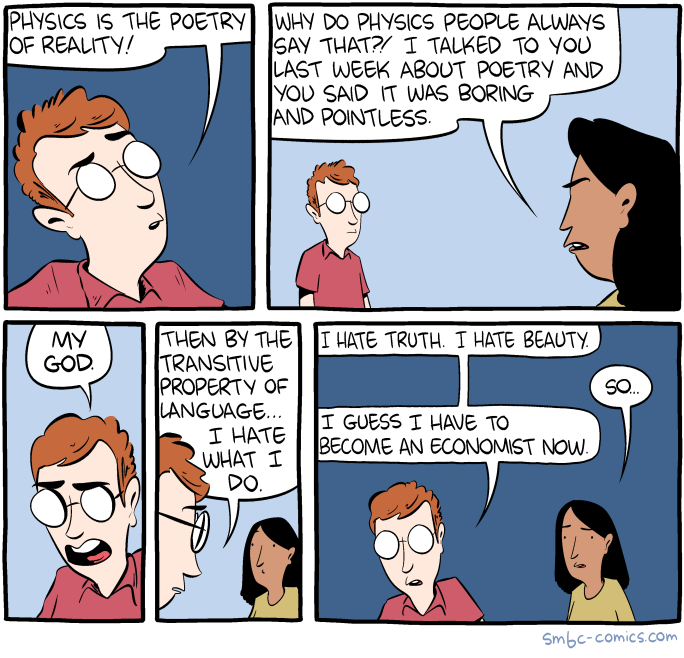Poetry and reality
« previous post | next post »
Today's SMBC:
Mouseover title: "New rule: Anyone referring to X as the poetry of Y must have actually ever read a poem."
Not strictly relevant to the Neil deGrasse Tyson discussion, since linguistics is a science and all. But still.
Note the the licensing of negative-polarity "ever" by "must have actually":
"Anyone referring to X as the poetry of Y must have actually ever read a poem"
Also, the transition from physicist to Wall Street or hedge fund quant is more empirically plausible.

bks said,
March 4, 2017 @ 10:02 am
"Physics is the conceptual art of the late 20th century." — Jack Sarfatti
Bloix said,
March 4, 2017 @ 10:58 am
"Have you ever read a poem?" – okay
but "I have ever read a poem." – not okay.
What do others think?
[(myl) The standard story about this is that "ever" is a "polarity item", which is licensed in negative contexts ("They haven't ever admitted it") and in question contexts "Have they ever admitted it?") but doesn't work in general ("*They've ever admitted it"). A variety of irrealis contexts also work, such as indirect questions ("I wonder whether they've ever admitted it") and counterfactuals ("If they ever admitted it, we would feel better").]
Andrew Usher said,
March 4, 2017 @ 12:32 pm
In my judgement, 'must have actually' is not sufficient to license 'ever' and the sentence sounds unmistakably wrong – perhaps deliberately so, given that this is a comic strip. A simple conditional does not license NPIs in general, e.g. *They might have any dough (correct: some dough, as in normal declaratives).
k_over_hbarc at yahoo.com
Jerry Friedman said,
March 4, 2017 @ 12:59 pm
Apparently this is based on a quotation from Richard Dawkins, "Science is the poetry of reality."
Guy said,
March 4, 2017 @ 2:48 pm
I understood the "ever" to be usage in a context where it wouldn't ordinarily be licensed for comedic/emphatic effect. This kind of misuse of a negative polarity item is a pretty common comedic trope (although I'm sure a lot of people who make these jokes aren't consciously aware of why it works).
Arthur Baker said,
March 4, 2017 @ 3:14 pm
Hasn't the writer just intended to write 'never' and accidentally omitted the 'n'?
Idran said,
March 4, 2017 @ 4:21 pm
@Arthur Baker: No; the meaning of the alt-text is "if you want to compare things to a poem, you must have read a poem".
Guy said,
March 4, 2017 @ 4:22 pm
@Arthur Baker,
No, that would produce the opposite of the intended meaning. "Must" here has deontic modality, not epistemic modality.
Geoff said,
March 4, 2017 @ 5:44 pm
When I first read the mouse over, I took it as epistemic modality and hallucinated the missing 'never'. I didn't understand the comments until I read it again more closely.
Haamu said,
March 4, 2017 @ 5:56 pm
In fairness to Arthur Baker, "must have" is ambiguous in a way that "must" alone is not.
Compare "Anyone doing X must do Y" with "Anyone doing X must have done Y." In the first case, there may be some temporal ambiguity as to whether X or Y comes first, but in the second case it's ambiguous whether "must have" signals (1) a constraint or (2) an explanation.
Interestingly, Idran's restatement carries the same ambiguity.
In the case of the cartoon, what disambiguates it is that the statement is prefaced by the words "New rule."
Guy said,
March 4, 2017 @ 10:20 pm
@Haamu
"Must" without "have" can also have epistemic modality: "I don't see him, he must not be here". But epistemic modality is more salient with "must have" because the deontic interpretation is often pragmatically impossible; "You must have done it" doesn't make sense as a command, because whether they have done it is no longer alterable so the command can't possibly achieve its purpose. The only reason it's possible here is because of the semantically conditional nature of the command. Compliance can be achieved not only by changing whether you satisfy the predicate but also by changing whether you are a referent of the subject.
David P said,
March 4, 2017 @ 11:07 pm
I vote for "must have never" (epistemic) because it's funnier that way.
Michael Watts said,
March 7, 2017 @ 7:40 pm
To me, the "ever" is grammatical. It's not that it's specifically licensed by "must have actually"; it's that it is licensed by the contrast with the hypothetical sentence "[someone] has actually never read a poem" — when I want to explicitly express the opposite of "never", I have to use "ever".
This is similar to how "I do like eggs" is ungrammatical with no context, but conventional in response to something like "do you not like eggs?"
January First-of-May said,
March 9, 2017 @ 3:25 am
I personally think that "must have actually ever read a poem" works only barely and mainly because of the comedic effect (as Guy noted), but if rearranged to "must actually have ever read a poem", it flows a lot better (though still feels a bit weird).
That said, I'm not a native English speaker, so my intuition here may be faulty.